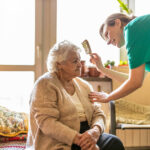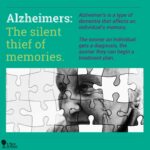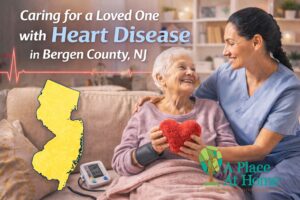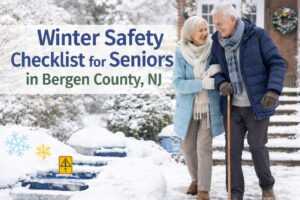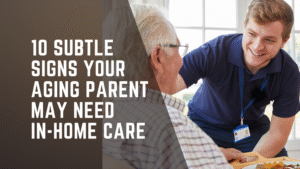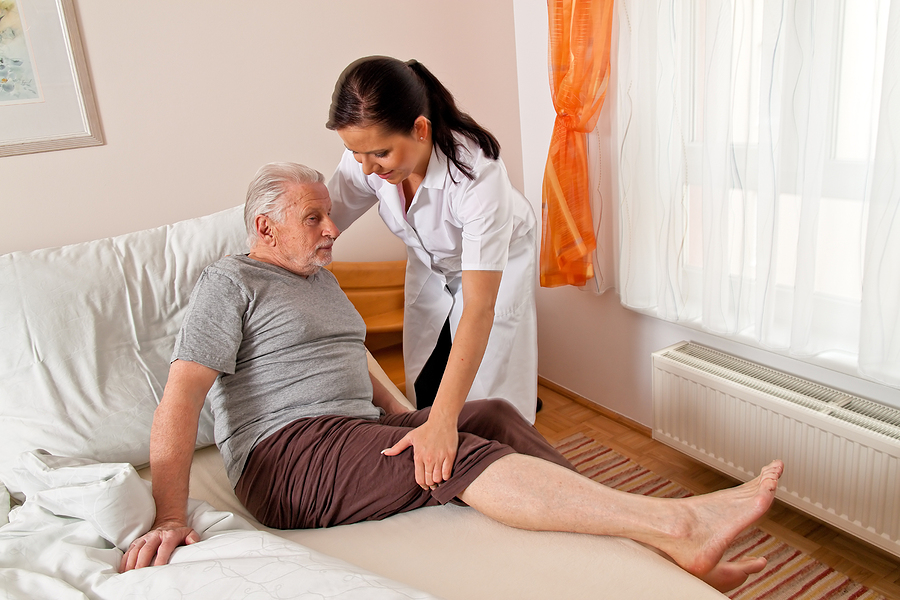
Falls among older adults are more common than many families realize—and the consequences can be life-changing. A single fall may cause serious physical injuries, but it can also affect a senior’s confidence, independence, and overall well-being. As our loved ones age, natural changes like muscle weakness, balance issues, and health conditions increase the risk of falling. That’s why understanding the causes, risks, and simple prevention strategies is so important. By addressing fall risks early, you can help your parent or loved one stay safe, maintain their independence, and enjoy a higher quality of life at home.
Common Causes of Falls in Seniors
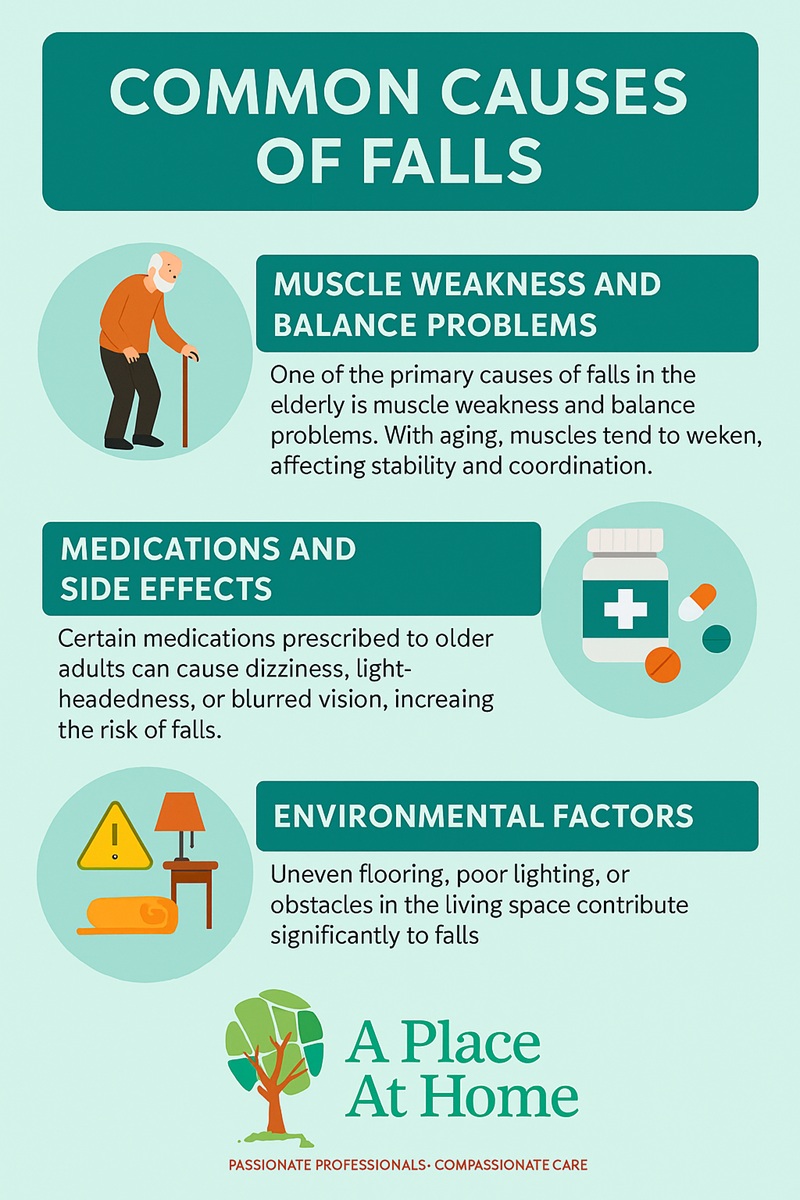
Muscle Weakness and Balance Issues
As parents age, it’s natural for muscles to lose strength, which can affect balance and coordination. In Bergen County, many families notice their loved one becoming less steady on their feet. Recognizing these early signs is key to preventing falls before they happen.
Medications and Side Effects
Many seniors take daily prescriptions, but some can cause dizziness, lightheadedness, or blurred vision. These side effects greatly increase the risk of a fall. If you notice your loved one feeling unsteady after starting or changing medication, it’s important to speak with their healthcare provider right away.
Home Hazards and Environmental Factors
Simple things around the home like poor lighting, throw rugs, or cluttered walkways can easily lead to a fall. Small safety updates such as installing brighter lights, securing rugs, and removing obstacles can make a big difference in keeping your loved one safe.
If you’re worried about fall risks for your parent or loved one in Bergen County, NJ, our compassionate caregivers can provide the support they need to stay safe, confident, and independent at home.
Health, Emotional & Financial Impacts of Falls
For families in Bergen County, NJ, a single fall can set off a chain of challenges for an aging parent.
Physical: Falls often lead to fractures (hip, wrist), sprains, or head injuries that may require ER visits, surgery, and rehab followed by weeks of reduced strength and mobility.
Emotional: Many seniors develop a fear of falling again, which can limit activity, reduce confidence, and lead to isolation or low mood creating a cycle that increases future fall risk.
Financial: Costs can add up quickly from hospital bills and therapy to home modifications, mobility devices, and time off work for family caregivers.
The good news: early prevention, a prompt medical and therapy plan, and consistent support at home can soften these impacts and help your loved one stay safe and independent.
Preventive Measures to Keep Seniors Safe in Bergen County
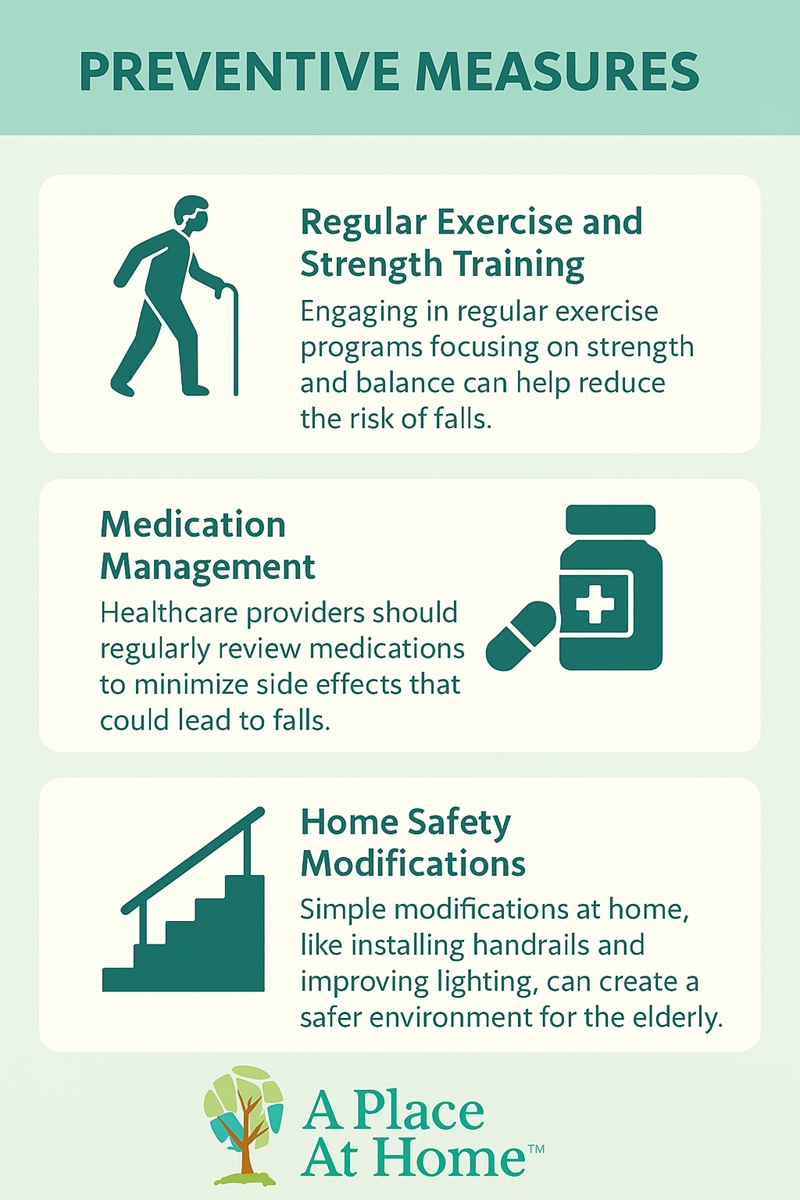
Stay Active with Exercise & Balance Training
Encouraging your loved one to participate in safe exercise programs like walking, stretching, or gentle strength training can improve balance, build muscle, and greatly reduce fall risks.
Review Medications Regularly
Ask your loved one’s healthcare provider to review their prescriptions. Adjustments or changes can help minimize side effects such as dizziness or blurred vision, which often contribute to falls.
Make the Home Safer
Simple updates at home, such as installing sturdy handrails, adding brighter lighting, and removing clutter or throw rugs, can significantly lower the risk of falls and give your parent more confidence moving around.
If you’re concerned about fall prevention for a loved one in Bergen County, NJ, our compassionate caregivers at A Place At Home can help create a safer, more supportive environment.
Role of Caregivers and Family in Keeping Seniors Safe
In Bergen County, NJ, family members and caregivers play a vital role in protecting seniors from fall risks and creating a safe, supportive environment at home. From helping with daily routines to ensuring the home is free of hazards, their involvement can make all the difference in a senior’s confidence and independence. Caregivers provide consistent monitoring, gentle reminders, and hands-on support, while family members offer encouragement and emotional reassurance. Together, they form a strong safety net that not only reduces the risk of falls but also gives seniors the comfort of knowing they are cared for and never alone.
Supervision and Support
Caregivers and family members play a vital role in supervising the elderly, especially those at a higher risk of falls. Offering physical assistance and emotional support can boost their confidence.
Creating a Safe Living Environment
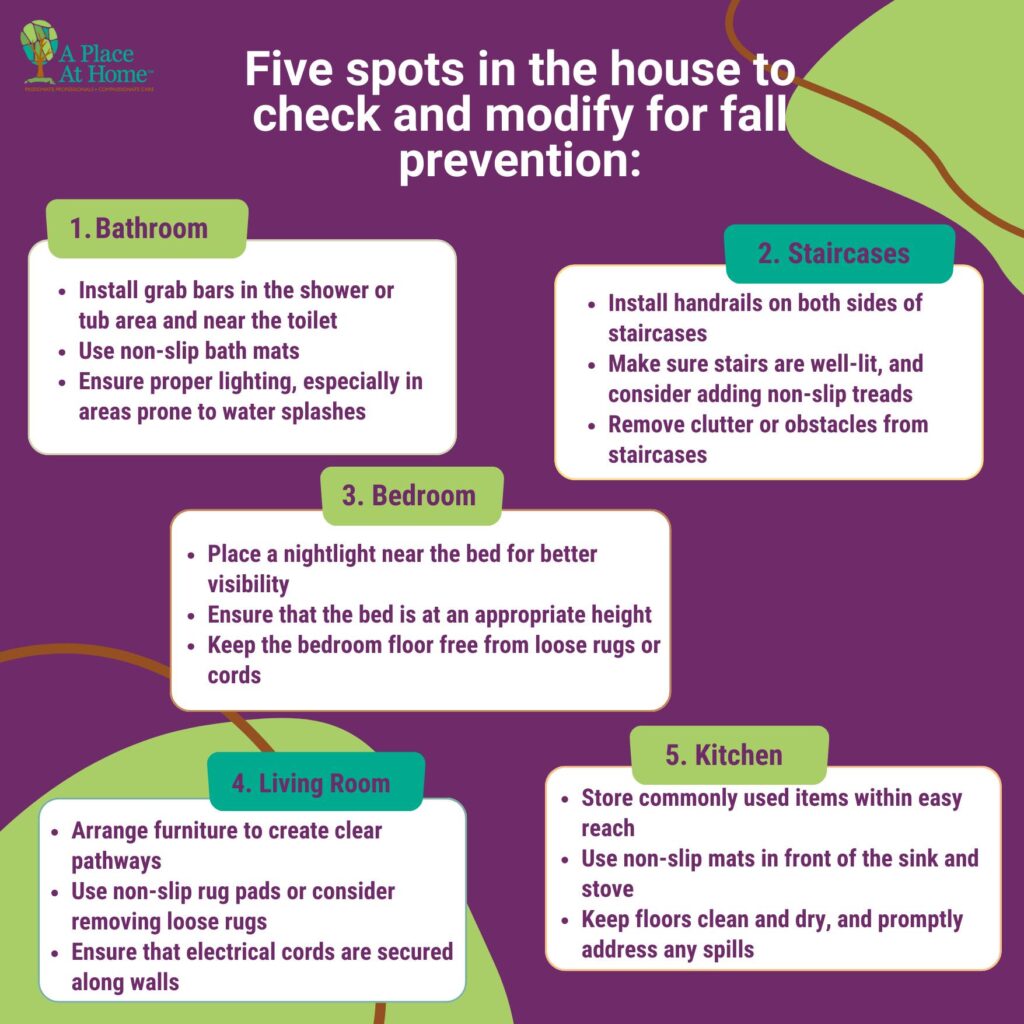
Ensuring that the living space is well-maintained, clutter-free, and equipped with necessary safety features can prevent accidental falls.
Communication with Healthcare Providers
Open communication with healthcare providers is essential. Regular check-ups allow for the monitoring of the elderly’s health and the adjustment of medications if needed.
Community Resources and Support
If you’re caring for a parent in Bergen County, tap into local options that make a real difference. Senior centers, YMCAs, and hospital-based programs often host fall-prevention classes that build balance and confidence. Support groups (for caregivers and for seniors with fear of falling) provide a safe space to share experiences and learn practical tips. Short educational workshops can help you spot home hazards, review medication risks, and set up a simple safety plan.
Assisted Living (When More Support Is Needed)
If your loved one needs round-the-clock oversight, assisted living can offer a safer environment with trained staff to help with bathing, dressing, and medication reminders. Look for grab bars, well-lit hallways, and on-site wellness or therapy services. Many communities offer short respite stays so families can try the setting before making a decision.
Medical Alert Systems
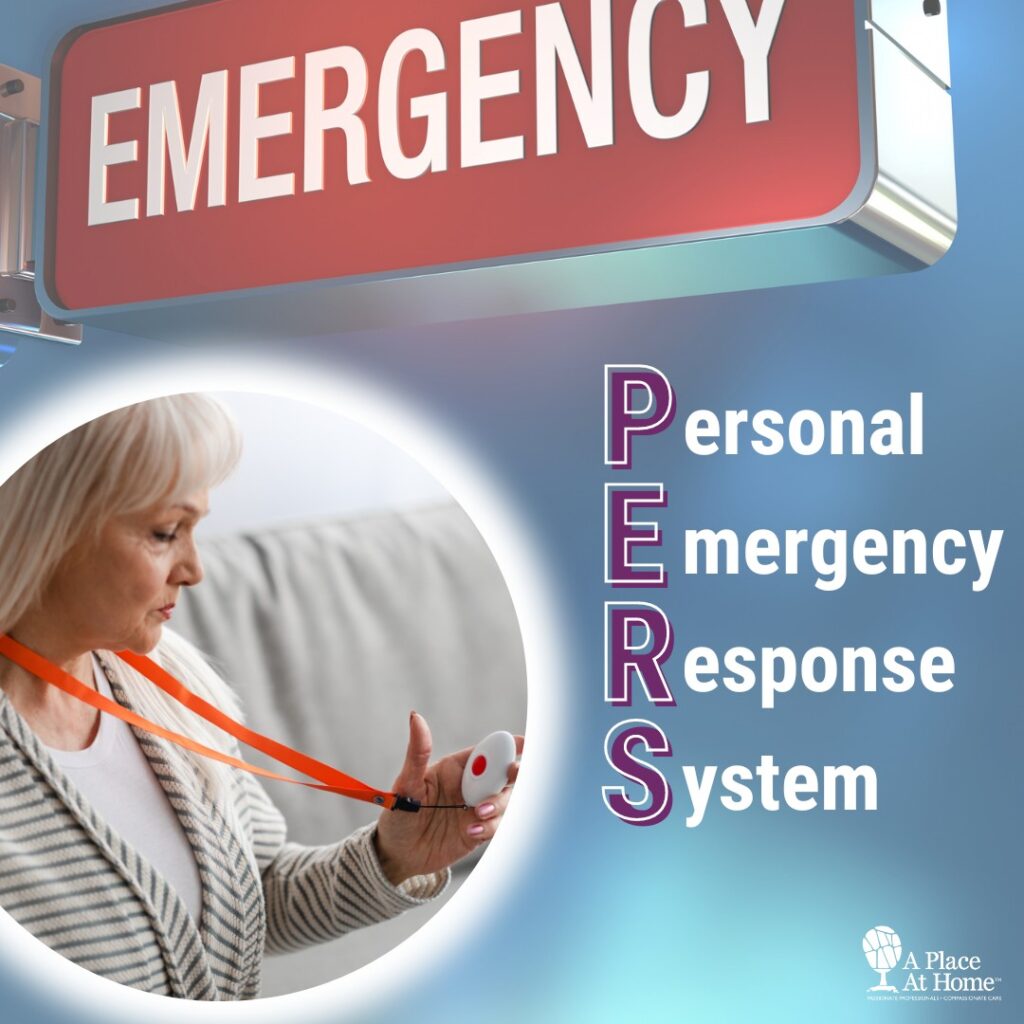
A wearable medical alert with fall detection gives seniors a fast way to call for help and gives families peace of mind. Choose devices with clear two-way audio, automatic alerts after a detected fall, and easy charging. Agree on a response plan (who gets notified first) and test the device regularly.
Home Care Services (Stay Safe at Home)
If your goal is to keep Mom or Dad living safely at home, in-home care can bridge the gap. Caregivers provide mobility support, medication reminders, help with ADLs (bathing, dressing, toileting), light housekeeping, meal prep, and companionship. They can also coordinate with PT/OT and reinforce home exercise plans after a fall.
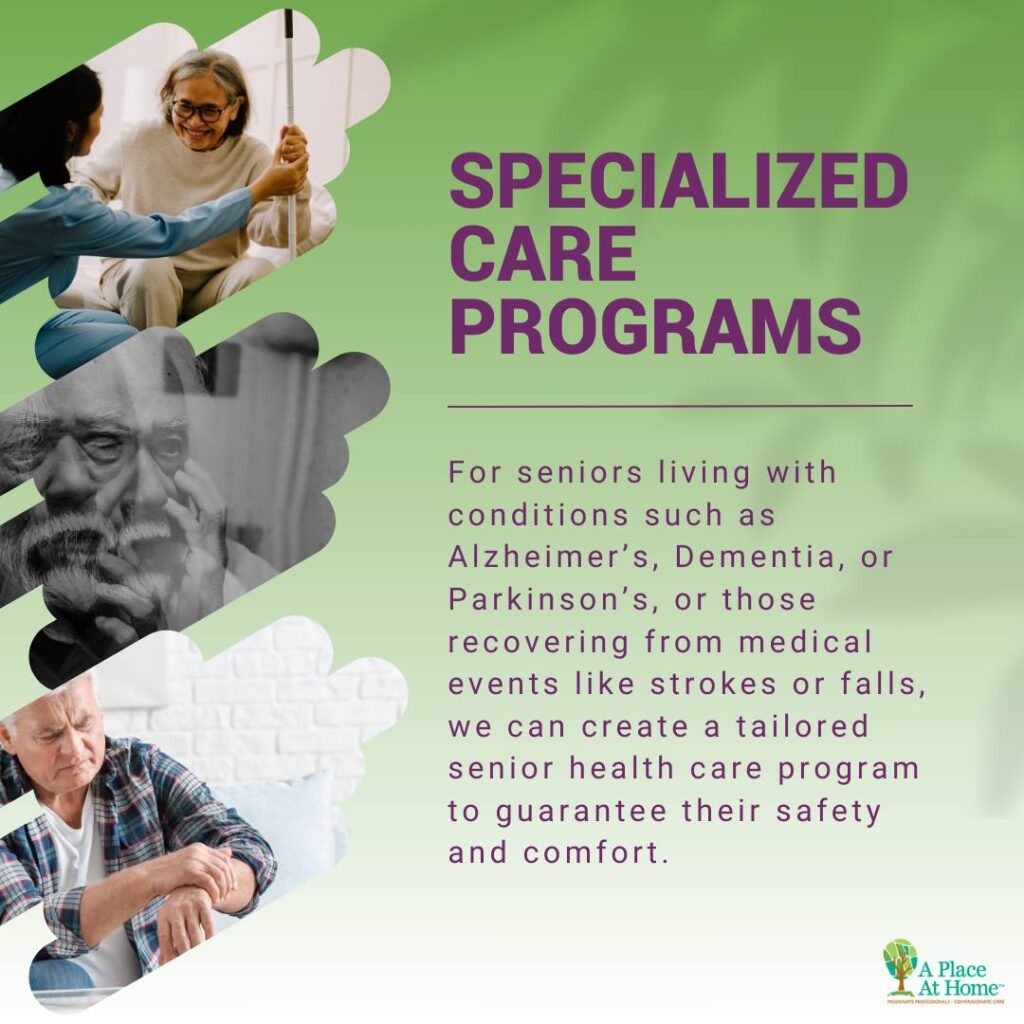
The A Place At Home team stands ready to guide you. A Place At Home – Westwood professional caregivers are the foundation of our in-home care services. At A Place At Home, our trained caregivers prioritize your safety, comfort, and swift recovery. Let A Place At Home in Westwood, NJ be your partner in the journey back to full health.
Medical Interventions
Partnering with the right clinicians can speed recovery after a fall and lower future risk. Here are the key supports to ask about in Bergen County, NJ:
Physical Therapy
A licensed PT can evaluate balance, strength, and gait, then build a personalized plan to improve mobility and confidence. Expect targeted exercises, safe transfer techniques (“sit-to-stand,” stair training), and guidance on using canes or walkers correctly to reduce fall risk at home.
Vision Care & Correction
Schedule routine eye exams and update prescriptions promptly. Treating issues like cataracts or glaucoma and using the right lenses can sharpen depth perception and contrast. Pair this with brighter task lighting at home to prevent missteps and nighttime falls.
Orthopedic Consultations
If a fall causes pain, a suspected fracture, or ongoing joint problems, an orthopedic specialist can diagnose and treat the injury, recommend bracing if needed, and coordinate a rehab plan with PT/OT. Early evaluation supports safer, faster healing and a stronger return to daily activities.
Need help coordinating appointments or following through on home exercises? Local caregivers can support your loved one in Bergen County, NJ with reminders, transportation, and safety-focused care at home.
Promoting Independence After a Fall
For many families in Bergen County, NJ, one of the biggest concerns after a senior experiences a fall is helping them regain confidence and independence. Beyond treating physical injuries, recovery also means addressing the emotional impact – seniors may fear falling again, which can limit their activity and quality of life. With the right support, including caregiver assistance, gentle exercise programs, and home safety modifications, older adults can rebuild strength and trust in their abilities. Encouragement from family and compassionate guidance from professional caregivers can empower seniors to stay active, engaged, and independent in their daily lives.
Rehabilitation Services
After a fall, partnering with a physical or occupational therapist can help your parent in Bergen County, NJ rebuild strength, improve balance, and safely return to daily routines. Therapy focuses on practical goals like getting in and out of a chair, navigating stairs, and walking with confidence.
Assistive Devices
The right equipment such as a properly fitted walker or cane, grab bars in the bathroom, and non-slip mats adds stability and reduces fall risk. A PT/OT can recommend and fit devices so your loved one moves safely and more independently at home.
Emotional Support
Recovery isn’t just physical. Consistent encouragement from family, check-ins from caregivers, and, when needed, support from a mental health professional can ease fear of falling and rebuild confidence. A positive mindset helps seniors stay engaged, active, and motivated throughout recovery.
Fall Prevention by A Place At Home – Westwood
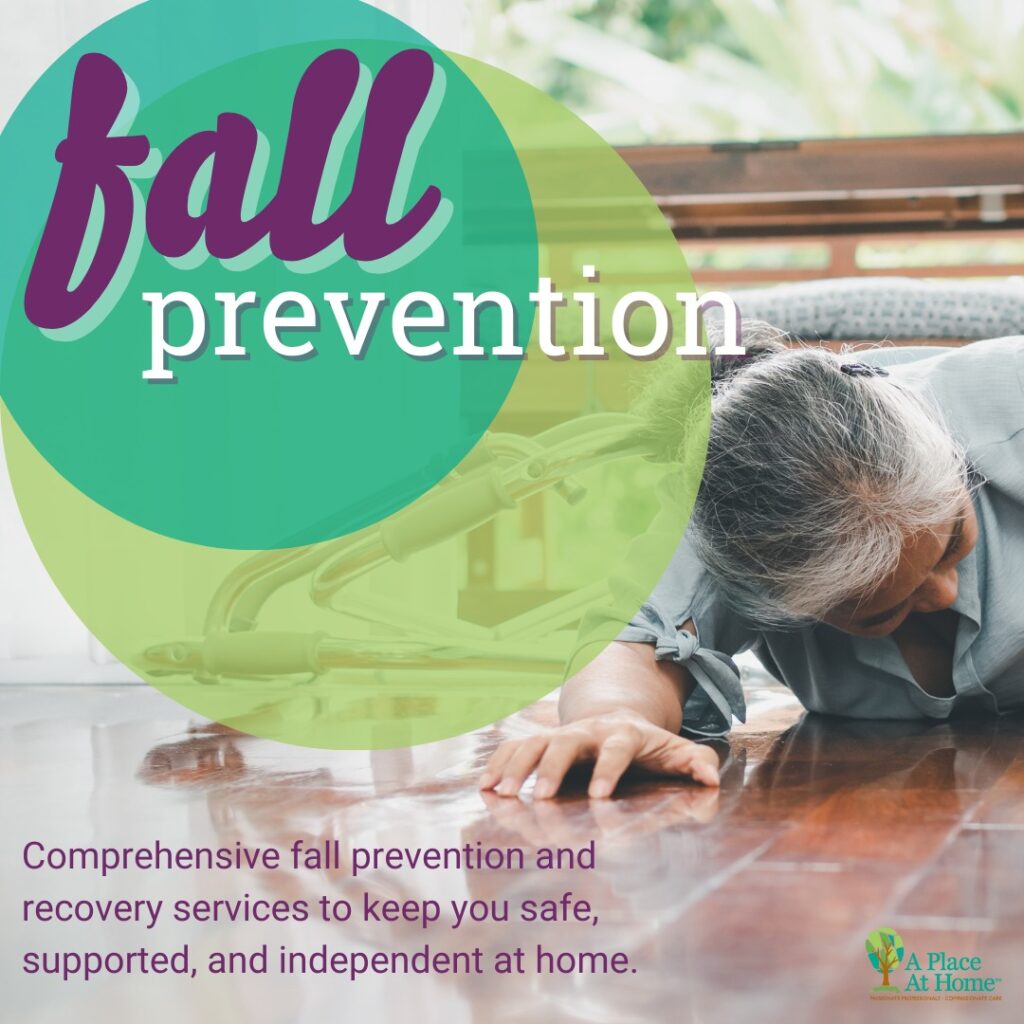
In conclusion, falls in the elderly are preventable with adequate awareness, education, and intervention. By understanding the causes, recognizing the signs, and implementing preventive measures, the elderly population can lead fulfilling lives without the constant fear of falling. Creating a safe environment, staying physically active, and seeking timely medical advice are key steps toward fall prevention and recovery.
A Place At Home – Westwood offers fall prevention services and senior home care, providing personal assistance with tasks that may pose potential risks and mobility issues. All caregivers at our home care agency are bonded, insured, and licensed to provide non-medical home health care to seniors.
Call A Place At Home – Westwood at (201) 890-5789!
FAQ: Falls in Elderly (for Bergen County Families)
1) What are the most common causes of falls in seniors?
Muscle weakness, balance issues, side effects from medications (dizziness/blurred vision), poor lighting, clutter, loose rugs, and vision or hearing changes are leading causes.
2) How do I know if my parent is at high risk for a fall?
Watch for unsteadiness, “furniture walking,” recent medication changes, multiple chronic conditions, foot pain, or a previous fall in the last year. Any of these raise risk.
3) What should I do immediately after my loved one falls?
Stay calm, check for pain/bleeding, and don’t rush them up. If there’s injury, head hit, confusion, or you’re unsure, call 911. If they seem okay, help them up slowly and inform their doctor.
4) When should I call 911 after a fall?
Call if there’s head injury, loss of consciousness, severe pain, inability to stand, bleeding that won’t stop, new confusion, or if your loved one is on blood thinners.
5) How can we prevent nighttime falls?
Add motion-sensor nightlights, keep a clear path to the bathroom, place a bedside commode if needed, review evening meds, and ensure properly fitted footwear (no loose slippers).
6) Which home modifications make the biggest difference?
- Bright, even lighting and nightlights
- Remove clutter/loose rugs; add non-slip mats
- Secure handrails on both sides of stairs
- Grab bars in shower and by the toilet; shower chair
- Raised toilet seat and clearly marked step edges
7) Do medications increase fall risk? What should I ask the doctor?
Yes – sedatives, sleep aids, some blood pressure meds, and pain meds can cause dizziness. Ask: “Which meds raise fall risk? Any safer alternatives? Can we adjust timing or dose?”
8) What exercises help with balance and strength?
Gentle strength and balance programs (e.g., chair exercises, heel-to-toe walk, leg raises, tai chi) are effective. A PT can personalize a safe plan after a fall assessment.
9) Should my parent use a cane or walker?
A properly fitted device can improve stability. Ask a PT/OT to recommend and fit the right cane or walker and teach safe use. Improper fit can increase risk.
10) How often should vision and hearing be checked?
At least annually, or sooner if you notice changes. Updated glasses and hearing support improve spatial awareness and reduce missteps.
11) What footwear is safest at home?
Closed-back, low-heel shoes with non-slip soles and good fit. Avoid socks on smooth floors, backless slippers, or high heels.
12) How can caregivers reduce falls without taking away independence?
Provide standby support, set up the home for success, cue safe techniques (e.g., “nose over toes” to stand), and encourage activity so strength and confidence grow.
13) Does Medicare cover fall-prevention services or equipment?
Often, medically necessary physical/occupational therapy is covered with a provider’s order. Many durable medical equipment items (e.g., walkers) may be covered; most structural home modifications are not. Ask your provider/plan for specifics.
14) How do we rebuild confidence after a fall?
Start with small, supported activities, celebrate progress, follow a PT plan, and address home hazards. Consistent encouragement from family and caregivers helps overcome fear of falling.
15) How can A Place At Home support families in Bergen County, NJ?
We provide fall-prevention focused care: home safety checklists, medication reminders, mobility assistance, personal care, and coordination with PT/OT, helping your loved one stay safe, confident, and independent at home.

